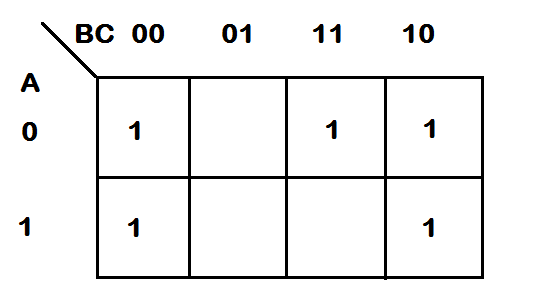K-Map technique is a straight forward and simple method for minimizing Boolean functions. In this article, you will learn a special case of K-map, when the function is in a Standard Sum of Product and not in a Canonical Sum of Product form.
For example
F = A'B'C' + ABC' - (1)
F = A'B + BC' + A'B - (2)In function1, each term is called a minterm( A’B’C). The sum of minterms is called a Canonical Sum of Product. It can be directly taken from the Truth Table for the function.
The function2 has terms called a product term which may have one or more literal. The sum of all such terms is called a Standard Sum of Product. The same concept applies for Canonical Product of Sum form.
Now the problem is that if you are given a standard sum of product for Boolean minimization, what to do, because it appears that its already minimized.
How to simplify the function ( 2 )using K-Map?
Create a three variable map like we do always .and put 1 in the box where a particular term is missing .
A'BWhich term is missing? yes right! it’s C
A'B( C + C')
A'BC + A'BC'In the map you put 1 in the cell for both
A'BC + A'BC'Similarly, Solve other missing variable in each of the terms of the function.

Now, you can minimize the above 3-variable K-Map easily because you have identified the correct boxes.